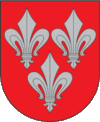Jurbarkas
| Jurbarkas | |||
|---|---|---|---|
| City | |||
 |
|||
|
|||
| Location of Jurbarkas | |||
| Coordinates: 55°5′N 22°46′E / 55.083°N 22.767°ECoordinates: 55°5′N 22°46′E / 55.083°N 22.767°E | |||
| Country |
|
||
| Ethnographic region | Samogitia | ||
| County | Tauragė County | ||
| Municipality | Jurbarkas district municipality | ||
| Eldership | Jurbarkas city eldership | ||
| Capital of |
Jurbarkas district municipality Jurbarkas city eldership |
||
| First mentioned | 1258 | ||
| Granted city rights | 1611 | ||
| Population (2010) | |||
| • Total | 12,972 | ||
| Time zone | EET (UTC+2) | ||
| • Summer (DST) | EEST (UTC+3) | ||
Jurbarkas (![]() pronunciation ; Polish: Jurbork, known also by several alternative names) is a city in Tauragė County, Lithuania. It is on the right-hand shore of the Neman River at its confluence with the tributaries Mituva and Imsre. The town became an important road junction after a bridge was built over the Nemunas River in 1978.
pronunciation ; Polish: Jurbork, known also by several alternative names) is a city in Tauragė County, Lithuania. It is on the right-hand shore of the Neman River at its confluence with the tributaries Mituva and Imsre. The town became an important road junction after a bridge was built over the Nemunas River in 1978.
The name Jurbarkas is derived from the Ordensburg castle, Georgenburg, built in the 13th century.
Jurbarkas has also been known by many derivate spellings in various languages throughout its history. The most notable non-Lithuanian names for the city include: in German, Georgenburg, Jurgenburg, and Eurburg, in Polish, Jurbork, and in Yiddish יורבורג (Yurburg).
Although Jurbarkas is said to have been a seat of Lithuanian princes from the Palemonids legend, it was first documented in 1259 as the Teutonic Knights' Ordensburg castle of Georgenburg ("George's castle") on the Neman. This castle was constructed 3 km (1.9 mi) west of the current town on a hill now known as Bispiliukai, while the Lithuanians built a castle on Bispulis hill by the Imsre. Although the German crusaders were often at war with the Lithuanians, Mindaugas, King of Lithuania, did not oppose Georgenburg's construction after his conversion to Christianity.
...
Wikipedia



